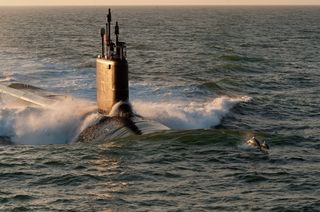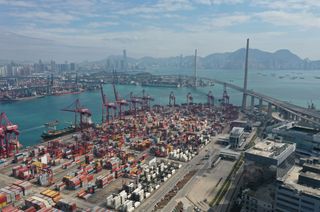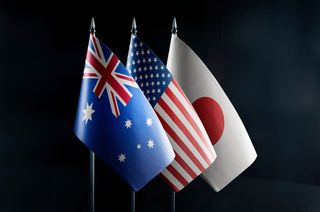Two years on from 9/11 then-US Vice President Dick Cheney remarked how the terrorist attacks on New York and Washington had "changed everything" - that American national security strategy had altered forever.
9/11 indeed changed the world – from geopolitics, peace and stability to freedom, democracy and human rights. It has also changed the global standing of the US, now recognised for its vulnerabilities as well as its strengths.
With the tenth anniversary looming, and in ways Cheney could not have anticipated, 9/11 has changed everything – but how?
This conference brought together government decision-makers past and present, thought leaders and academic experts from the US, Australia and around the world to take stock of the first epoch of the new millennium, The 9/11 Decade.
PROGRAM
SUNDAY
COCKTAIL RECEPTION Art Gallery of New South Wales, The Domain, Sydney
MONDAY
WELCOME Michael Spence, Vice-Chancellor and Principal, the University of Sydney
AUSTRALIAN AND AMERICAN PERSPECTIVES From the moment the terrorists struck in 2001, Australia has partnered with the US in the struggle against Islamic extremism and still today has the largest presence in Afghanistan outside NATO. Senior leaders of both governments discuss the impact of the 9/11 decade on their countries.
Jeffrey Bleich, United States Ambassador to Australia; and former Special Counsel to President Obama
Dennis Richardson AO, Secretary of the Department of Foreign Affairs and Trade; former Australian Ambassador to the US (2005 to 2009); and former Director-General of ASIO (1996 to 2005)
Moderator: Geoffrey Garrett, CEO of the United States Studies Centre and Professor of Political Science at the University of Sydney
THE WAR(S) ON TERRORISM From Iraq and Afghanistan to Libya and Pakistan, American military intervention has been the leitmotif of the 9/11 decade. Hear from two men who were at the centre of their countries' entry in the war on terrorism as well as Australia's leading critic of how the war has been waged.
Peter Cosgrove AC MC, Chancellor of the Australian Catholic University; former Chief of the Australian Defence Force (2002 to 2005); and Australian of the Year (2001)
Douglas Feith, Senior Fellow and Director, Center for National Security Strategies, Hudson Institute; former United States Under Secretary of Defense for Policy (2001 to 2005); and author of War and Decision: Inside the Pentagon at the Dawn of the War on Terrorism
Paul McGeough, Senior Foreign Correspondent for The Sydney Morning Herald; Walkley Award winner for journalism leadership (2003); and author of four books on the war on terrorism
Moderator: Mark Colvin, an award winning journalist and presenter of ABC Radio's current affairs program, PM
RETHINKING AMERICAN POWER Before 9/11, the US strode the global stage as the world's sole superpower. A decade later, many believe the eagle has been mortally wounded by the one-two punch of 9/11 and the global financial crisis. Three prominent American, Australian and European voices assess the US's changing global role.
Julie Bishop, Deputy Leader of the Opposition, Shadow Minister for Foreign Affairs and Trade and MP for Curtin
Robert Kaplan, National Correspondent for The Atlantic Monthly; Senior Fellow at the Center for a New American Security; and author of Monsoon: The Indian Ocean and the Future of American Power
Anatol Lieven, Professor of War Studies, King's College London; Senior Fellow at the New America Foundation; and author of Pakistan: A Hard Country
Moderator: James Fallows, Chair in US Media, United States Studies Centre; and National Correspondent for The Atlantic Monthly
LUNCH: KEYNOTE ADDRESS
Allan Gyngell AO, Director-General of the Office of National Assessments; and founding Executive Director of the Lowy Institute for International Policy (2003 to 2009)
BREAKOUT SESSIONS
- The future of US foreign policy featuring Nicholas Burns, Sultan of Oman Professor, Kennedy School of Government, Harvard University; former United States Under Secretary of State for Political Affairs (2005 to 2008); and former United States Ambassador to NATO (2001 to 2005); in conversation with Michael L'Estrange AO, Director, National Security College at the Australian National University; and former Secretary of the Department of Foreign Affairs and Trade (2005 to 2009)
- American exceptionalism and anti-Americanism featuring Anatol Lieven in conversation with Brendon O'Connor, Associate Professor in American Politics and Director of Learning and Teaching at the United States Studies Centre
- Australia's grand strategy featuring Hugh White, Head of the Strategic and Defence Studies Centre at the Australian National University; and former Deputy Secretary in the Department of Defence (1995 to 2000); in conversation with James Curran, Senior Lecturer, United States Studies Centre and the University of Sydney; and former adviser and analyst in the Office of National Assessments (2005 to 2007) and Department of Prime Minister and Cabinet (2002 to 2005)
- Al Qaeda after Osama featuring Leah Farrall, former senior Counter Terrorism Intelligence Analyst, Australian Federal Police (2002 to 2008); and author of the blog All Things Counter Terrorism; and Bill Paterson, Australian Ambassador for Counter-Terrorism at the Department of Foreign Affairs and Trade; and former head of the Australian Government's Iraq Task Force; in conversation with Bob Carr, former Premier of New South Wales (1995 to 2005)
THE FREEDOM AGENDA AND THE ARAB SPRING Liberal internationalists on the left and neoconservatives on the right agree that freedom and democracy are worth fighting for, from Afghanistan to the Arab Spring. But the pathways are many, complex and uncertain. Three experts debate the past, present and future of the freedom agenda.
Adam Garfinkle, Editor of The American Interest; and former speechwriter for both of George W. Bush's Secretaries of State, Colin Powell and Condoleezza Rice
Stephen Krasner, Graham H. Stuart Professor of International Studies, Stanford University; and former Director of Policy Planning, United States Department of State (2005 to 2007)
Amin Saikal AM, Professor of Political Science and Director of the Centre for Arab and Islamic Studies at the Australian National University; and author of The Rise and Fall of the Shah: Iran from Autocracy to Religious Rule
Moderator: Eleanor Hall, presenter of ABC Radio's lunchtime current affairs program, The World Today; and former Washington Correspondent for the ABC
DINNER: ROUNDTABLE ON THE 9/11 DECADE
Welcome: Malcolm Binks, Chairman of the United States Studies Centre and the American Australian Association
Nicholas Burns, Sultan of Oman Professor, Kennedy School of Government, Harvard University; former United States Under Secretary of State for Political Affairs (2005 to 2008); and former United States Ambassador to NATO (2001 to 2005)
Gareth Evans AO QC, Chancellor of the Australian National University; former CEO of the International Crisis Group (2000 to 2009); and former Minister for Foreign Affairs (1988 to1996)
Robert Hill, Adjunct Professor in Sustainability, United States Studies Centre; former Australian Ambassador to the United Nations (2006 to 2009); and former Minister for Defence (2001 to 2006)
Moderator: Geoffrey Garrett
TUESDAY
THE US AND ASIA-PACIFIC CENTURY
Jeffrey Bader (via video streaming), Visiting Scholar with the John L. Thornton China Center at the Brookings Institution; former Senior Director for East Asian Affairs on the US National Security Council (2009 to 2011); in conversation with James Fallows
9/11 AT HOME Australia and the US have made great investments in homeland security since 9/11. But critics ask whether we are safer as a result and highlight the costs in terms of reduced civil liberties and higher barriers to immigration. Hear how government officials charged with securing their homelands during the 9/11 decade respond to their critics.
Robert Bonner (via video streaming), Senior Principal, Sentinel HS Group, a homeland security consulting firm; and founding Commissioner of US Customs and Border Protection (2001 to 2005)
Nicola McGarrity, Director of the Terrorism and Law Project at the Gilbert + Tobin Centre of Public Law at the University of New South Wales; and barrister at the New South Wales Bar
Michael Pezzullo, Chief Operating Officer of the Australian Customs and Border Protection Service; former Deputy Secretary Strategy in the Department of Defence (2006 to 2009); and the principal author of the Defence White Paper 2009
Moderator: Paul Kelly, Editor-at-Large and former Editor-in-Chief (1991 to 1996) of The Australian and author of seven books on Australian politics and foreign policy
BREAKOUT SESSIONS
- Afghanistan, Pakistan and Iran featuring Douglas Feith in conversation with Peter Khalil, Adjunct Associate Professor at the Centre for International Security Studies at the University of Sydney; and former Foreign Policy and National Security Adviser to Prime Minister Kevin Rudd
- The democracy promotion balance sheet featuring Stephen Krasner in conversation with Martine Letts, Deputy Director of the Lowy Institute for International Policy; and former CEO of the Australian Red Cross (2001 to 2005)
- The Indian Ocean monsoon featuring Robert Kaplan in conversation with Michael Wesley, Executive Director of the Lowy Institute for International Policy; and former Director of the Griffith Asia Institute at Griffith University
- The Bush legacy featuring Adam Garfinkle in conversation with Tom Switzer, Editor of The Spectator Australia, Books Editor of American Review and host of American Talk
LUNCH: KEYNOTE ADDRESS
Keynote address: Robert McClelland, Attorney-General of Australia, with principle responsibility for human rights, national security and counter-terrorism
THE DECADE AHEAD
The 1990s were a decade of confidence and optimism. The 2000s have been wrought by anxiety and uncertainty. What can we expect for the 2010s? The rise of China, the demise of the US, the future of extremism, the power of social networking? Global thought leaders discuss what to expect from the next decade.
Nicholas Burns Sultan of Oman Professor, Kennedy School of Government, Harvard University; former United States Under Secretary of State for Political Affairs (2005 to 2008); and former United States Ambassador to NATO (2001 to 2005)
James Fallows Chair in US Media, United States Studies Centre; and National Correspondent for The Atlantic Monthly
Douglas Feith Senior Fellow and Director, Center for National Security Strategies, Hudson Institute; former United States Under Secretary of Defense for Policy (2001 to 2005); and author of War and Decision: Inside the Pentagon at the Dawn of the War on Terrorism
Adam Garfinkle Editor of The American Interest; and former speechwriter for both of George W. Bush's Secretaries of State, Colin Powell and Condoleezza Rice
Stephen Krasner Graham H. Stuart Professor of International Studies, Stanford University; and former Director of Policy Planning, United States Department of State (2005 to 2007)
Anatol Lieven Professor of War Studies, King's College London; Senior Fellow at the New America Foundation; and author of Pakistan: A Hard Country
Moderator: Geoffrey Garrett CEO of the United States Studies Centre and Professor of Political Science at the University of Sydney
The National Summit was supported by Harvard University Committee on Australian Studies and Foreign Affairs magazine.



